US Warns Tehran Of Strong Response In Case Of Any Attacks
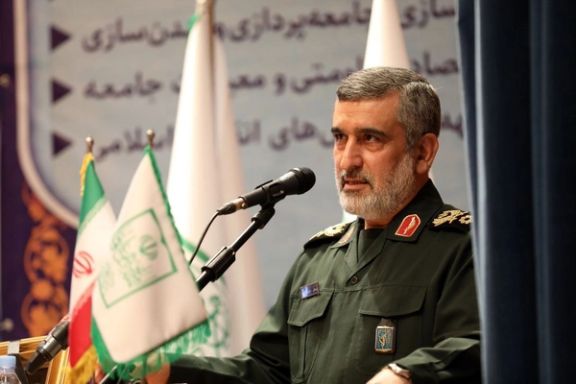
Washington has warned Tehran saying it would respond to any attacks after a top IRGC commander claimed the Islamic Republic intends to kill former US officials.

Washington has warned Tehran saying it would respond to any attacks after a top IRGC commander claimed the Islamic Republic intends to kill former US officials.
In an emailed statement to Al Arabiya English, the US State Department warned the clerical regime that “any attempt to harm US citizens, including those who served in the past, would be met with a strong response.”
Amirali Hajizadeh, the head of the Revolutionary Guards aerospace force, on Saturday spoke of Iran's often repeated threat to avenge the US killing of Qassem Soleimani, Tehran’s top military and intelligence operator in the Middle East, saying "We are looking to kill (former US President Donald) Trump."
"God willing, we are looking to kill Trump. (Former Secretary of State Mike) Pompeo ... and military commanders who issued the order (to kill Soleimani) should be killed," Hajizadeh said in the televised interview.
A US State Department spokesperson also reiterated Washington’s commitment to work with its allies and partners to deter and respond to any attacks carried out by Iran.
“Iran would test our resolve to protect our citizens at great peril. As the Administration has consistently made clear, the United States will protect and defend its citizens. This includes those serving the United States now and those who served in the past,” a State Department spokesperson said.
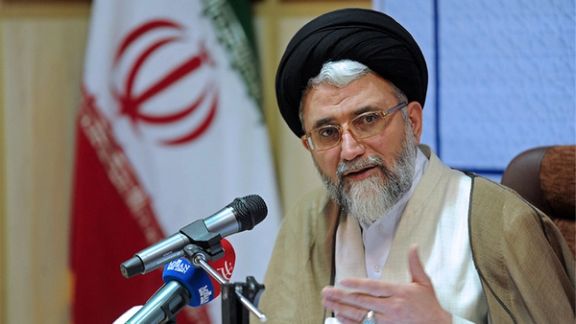
Two days after explosions and gunfire in Karaj near Tehran that government media described as military drills, Iran's minister of intelligence called it a "fake operation by the enemy".
Esmail Khatib said that "The enemies faked an operation in Karaj so that they could use it to gain prestige for themselves, but such fake news and propaganda will have a short life."
He did not clearly say if there was an attack and what was targeted, although there was visual evidence of explosions and anti-aircraft fire.
On Thursday night, residents in the area reported on social media that first a series of explosions were heard, and then anti-aircraft guns began firing into the air.
One of the videos shared by the citizens showed anti-aircraft tracer rounds soaring into the sky as an explosion could also be seen on the ground. There was no prior public notification of planned military exercises.
However, the official government news website IRNA citing an informed source, described the event as military drills by the IRGC near Karaj, during which targets were attacked by anti-aircraft systems.
A military installation in the central province of Esfahan was recently attacked by unknown drones and the Islamic Republic claimed Israel was behind the attack; however, the Israeli authorities did not comment on the matter.
Regarding the Esfahan attack, Khatib said “a team was arrested in Esfahan, and despite the training they received, it failed to carry out its operation.”
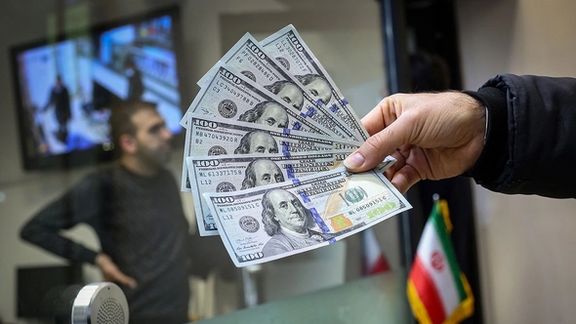
The rial’s plunge to 575,000 against the US dollar Saturday exacerbated chaos in several of Iran's major markets and brought many businesses to near standstill.
The government’s official rate of 417,500 for the dollar on Saturday meant very little. Availability of foreign currency at that rate is very limited which drives buyers to the curbside black market.
Fluctuations in the foreign currency exchange rates have immediate effect on the prices of several other commodities including gold, jewelry, and vehicles -- which many Iranians buy for investment or to preserve the value of their savings -- as well as electronic devices such as computers and smart phones and even home appliances.
The property market usually reflects the changes in exchange rates after a period of around 30 days but buyers and sellers both appear very apprehensive as the rial has been rapidly falling daily for about a week. No one can be certain how far the currency will fall and is not sure about any business decision.
The deep plunge of the rial has also affected many businesses where pricing is not as obviously reflective of foreign currency rates, as is the case with mobile phones and cars.
The price of mobile phones, for instance, rose sharply Saturday with many retailers preferring to hold on to their stock in anticipation of further fall of the rial. According to Etemad newspaper, an iPhone 13 Pro Max which sold for one billion rials ten days ago was priced at 1.2 billion on Thursday when the dollar traded around 560,000 on the street. The price of other brands and models such as Samsung phones has also risen accordingly.
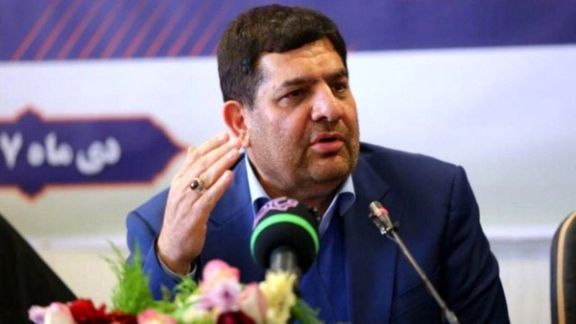
Some textile retailers and goldsmiths in the Grand Bazaar of Tehran, for instance, closed their shops Saturday afternoon as the rial continued to fall. In such circumstances, retailers as well as wholesalers are too reluctant to sell for the fear of not being able to replenish their stock with the ‘worthless’ money they earn.
The country is also suffering from an inflation rate of well over 50 percent.
The parliament held an extraordinary, closed session with First Vice President Mohammad Mokhber Saturday morning regarding rials fall and the chaos it has created for businesses.
Once again, Mokhber insisted that the problems which already existed when the administration of President Ebrahim Raisi took over in August 2021 are “gradually diminishing” and that the foreign currency market “will soon be stabilized” while the governor of the Central Bank of Iran (CBI), Mohammadreza Farzin, told lawmakers that only the rates announced by the bank’s new portal were “real”.
Many, however, believe that the rial’s depreciation will continue as long as the Islamic Republic does not reach an agreement with world powers over its nuclear program that can lift sanctions, and stop provoking the international community with rash remarks and statements.
Economy Minister Ehsan Khandouzi tried to convince the parliament that “hidden hands” were responsible for the chaos in the market and that these “saboteurs have been identified.” Security, intelligence, and judiciary bodies will soon deal with these people, he said.
The Islamic republic has resorted at times of similar to hanging individuals whom it accused of “corruption on earth” through their economic activities including destabilizing the foreign currency and gold markets at. Officials also usually accuse foreign governments and “enemies” whenever upheavals in the markets cause popular discontent.
In November 2018, Vahid Mazloumin, who came to be known in the media as “The Sultan of Gold Bullions” and another businessman Mohammad-Esmail Ghasemi were hanged in Tehran after being convicted of “creating a network to destabilize the country’s economic, foreign currency, and financial systems by conducting illegal transactions and large-scale smuggling of foreign currency and gold bullions.”

The international financial watchdog FATF has kept Iran and North Korea on its back list during its latest meeting that ended on Friday.
The Paris-based Financial Action Task Force is an inter-state organization that leads global action to tackle money laundering, terrorist and proliferation financing. Its recommendations impact decisions by governments and private sector firms in making banking and investment decisions.
Iran and North Korea are the only two countries on FATF’s black list, and all member states are urged to apply enhanced due diligence in dealing with them.
Experts say that even if sanctions imposed by Western countries on Iran are lifted, Tehran must adhere to FATF standards in banking and financial controls to be considered a safe business partner by international actors.
Most important are measures to prevent money laundering and financing of terrorism.
Although FATF’s decision comes as no surprise given Tehran’s refusal to accept its demands, it coincides with unprecedented financial and economic chaos in Iran in recent days.
Iran’s previous government submitted legislation to parliament in 2017 to adopt laws to implement FATF’s standards, but the hardliners have since prevented the final approval of the laws.
Opponents argue that if Iran accedes to FATF demands it will not be able to provide financial help to allied groups in the region that are part of Tehran’s “axis of resistance”.
These groups, such as the Lebanese Hezbollah and some Palestinian militant organizations, are designated as terrorist by some countries and act as proxy forces to help the Islamic Republic spread its influence in other countries.

Iran’s ministry of communications has backtracked, possibly temporarily, from a plan to provide unrestricted internet access to foreign visitors to encourage tourism.
In an interview Thursday with Miras-e Arya, a government-run news website dedicated to cultural heritage and tourism news, the communications minister, Isa Zare’i, said blocking of WhatsApp and Instagram in Iran has created “a little difficulty” for foreign tourists and that his ministry was planning to design special sim cards for them to use to be able to have better and easier access to such platforms.
Many on social media reacted angrily to the minister’s remarks and said the Iranian people had an equal right to have free access to social media platforms and websites that they wish to use.
“It’s true that a tourist, anywhere in the world, must be shown respect by the host country but it is racial discrimination and apartheid if special sim cards are provided to tourist to have specially tailored internet access when the people of that country are deprived of it,” one of the critics tweeted.
Another tweeter user pointed out that issuing such sim cards would encourage a black market.
In a statement Friday, the ministry said the reason for the plan was that foreigners visiting Iran for a short time must be allowed to connect with family and friends through their favored platforms, which are banned in Iran by law, and claimed Iranians are increasingly immigrating to unfiltered domestically-developed platforms.
The ministry went on to say there had been requests to provide limited-time tourist sim cards, which would expire when they leave the country, to provide them with access to certain filtered platforms to resolve their communications problems. “[Issuing] tourist sim cards is only a proposal and no decision has been taken about it yet,” the statement said.
The Twitter account of the government portal, PadDolat, has now removed the tweet which quoted the minister’s original remarks.
Iran has been censoring the internet and blocked most major social media platforms such as Facebook, Twitter, and YouTube for years. Amid recent protests, Instagram, the only freely accessible application which millions including small businesses and farmers used to promote and sell their commodities, was also blocked.
Social media users in Iran have largely shunned domestically developed social media applications such as Wisgoon and Nazdika, designed to replace Instagram, and Rubika, a messaging application, for various reasons including their quality and lack of privacy.
Experts have warned that domestic apps are very vulnerable to government intrusion and there are serious safety and privacy concerns including the fear that security services could be able to spy on people through them.
For years, many in Iran have relied on VPNs and anti-filtering software to navigate through government censorship and blocked social media and websites. The use of VPNs surged drastically following the recent nationwide protests. Farhikhtegan newspaper recently reported that based on a survey, 42 percent of all Iranians regularly use Telegram, and 38 percent WhatsApp and Instagram. All these platforms are only accessible if users install anti-filtering software or VPNs on their phones and computers for which they need to pay subscription fees of up to 2 million rials (around $4) per month.
Former Communications Minister Mohammad-Javad Azari-Jahromi has estimated that the market for VPNs is worth around 160,000 billion rials a year.
Iran has also been struggling with the mass cancellation of previously planned visits to Iran since protest erupted across the country in September following the death in custody of the 22-year-old Mahsa Amini who was arrested for not wearing her hijab “properly”. In November, the head of the Hoteliers Association, Jamshid Hamzehzadeh, said as much as 85 percent of all tours to Iran had been cancelled.
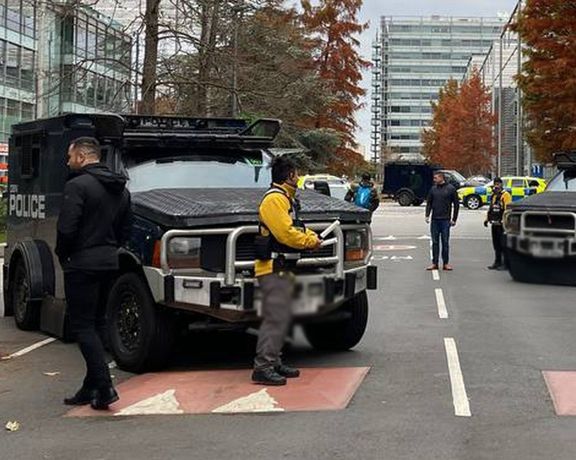
Canada has strongly condemned threats by the Iran's regime against journalists inside and outside the country, stressing that it supports the right to freedom of expression.
The foreign ministry told Iran International in a statement on Friday that “Ottawa stands for the right of everyone to hold opinions without interference and the right to freedom of expression and peaceful assembly, as enshrined in the Universal Declaration of Human Rights and the International Covenant on Civil and Political Rights.”
It also slammed the Iranian regime's gross and systematic violations of human rights and intimidation of its own people.
“We stand with the people of Iran, who call for change based on equality, respect and justice.”
The statement stressed that journalists, activists and media workers are the cornerstone of fair, strong and vibrant societies and must be free to do their work without fear of reprisals, political interference or intimidation.
“Any violence and intimidation against journalists or activists is completely unacceptable and must be condemned.”
Iran International was warned by British authorities in November that its journalists were under threat from Iranian agents and London’s Metropolitan Police took measures to strengthen security around the network’s office in the area.
On February 18, the network announced that following the advice of UK anti-terrorism officials it decided to temporarily move its studio operations to the US.
The decision solicited worldwide condemnations of Iran’s malign activities and specially threats against journalists.